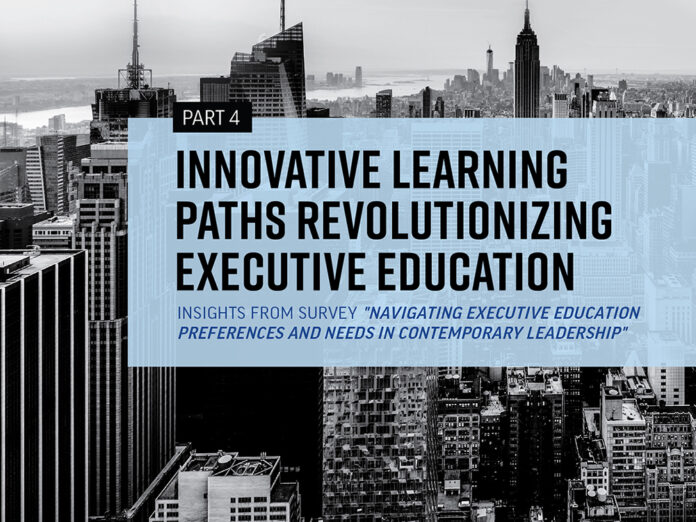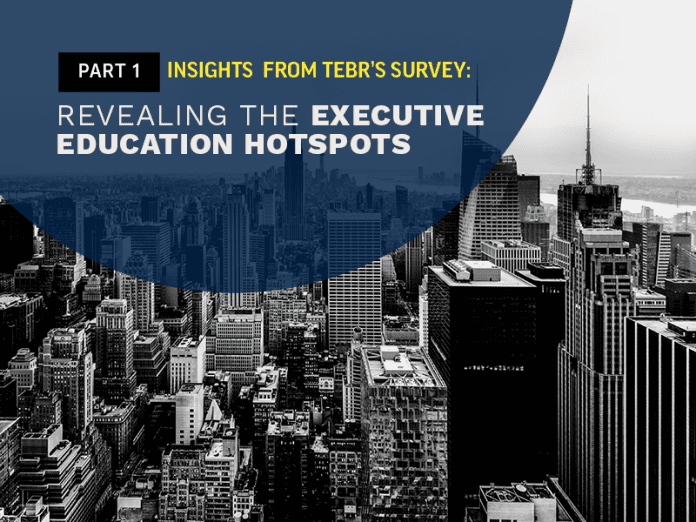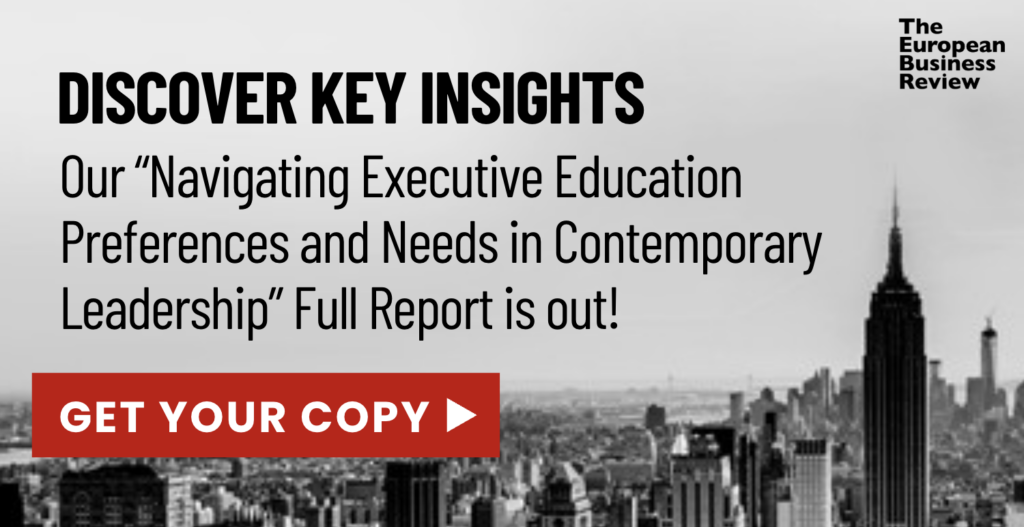Presented by the editors of The European Business Review
This article marks the fourth installment in our series of five articles to be published in our survey report for our recent survey, “Navigating Executive Education Preferences and Needs in Contemporary Leadership.” This analysis will highlight the growing demand for tailored, cohort-based programs that address specific organizational needs and emphasize the importance of new approaches in program design, including social and experiential learning, individual journeys, and the practical transfer of knowledge to the workplace.
|
|
|
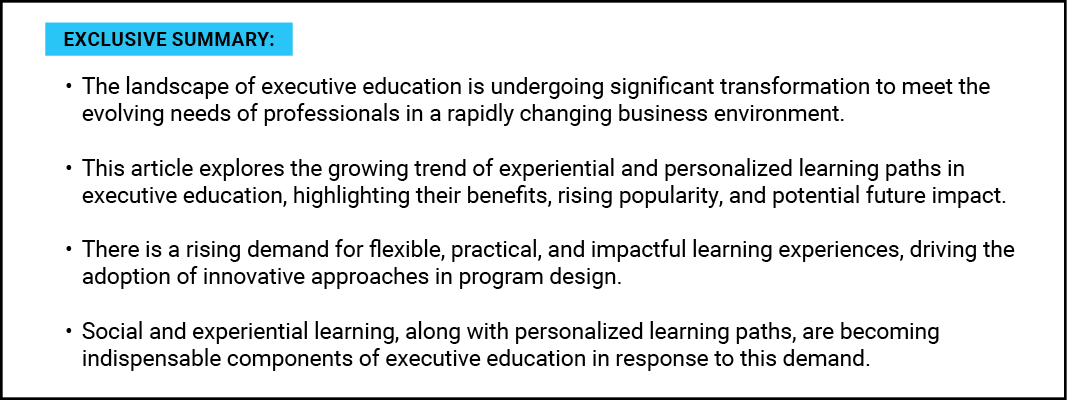
I. Introduction
The landscape of executive education is undergoing significant transformation, driven by the demand for innovative approaches that cater to the evolving needs of professionals. As the business world rapidly evolves, traditional educational models are increasingly seen as insufficient to meet the dynamic requirements of modern executives. The need for flexible, practical, and impactful learning experiences is more pronounced than ever, prompting a shift towards more customized and experiential learning methodologies.
This insight delves into the growing trend of experiential and personalized learning paths in executive education, offering a fresh perspective on how these approaches are reshaping the sector.
This insight delves into the growing trend of experiential and personalized learning paths in executive education, offering a fresh perspective on how these approaches are reshaping the sector. By examining these innovative learning methods, we aim to highlight their benefits, the reasons behind their rising popularity, and their potential future impact on executive education. Experiential learning, which involves engaging with real-world scenarios and hands-on activities, and personalized learning paths, tailored to the unique needs of each participant, are at the forefront of this educational revolution.
II. The Rise of Experiential Learning in Executive Education
Experiential learning, which emphasizes learning through experience and reflection, is becoming increasingly popular in executive education. This approach allows participants to engage in real-world scenarios within a controlled, risk-free environment, which fosters deeper understanding and retention of knowledge. By simulating practical situations, executives can experiment with strategies, make decisions, and observe outcomes without the high stakes associated with real-world applications. This method of learning not only enhances cognitive retention but also builds confidence and competence in handling complex business challenges.
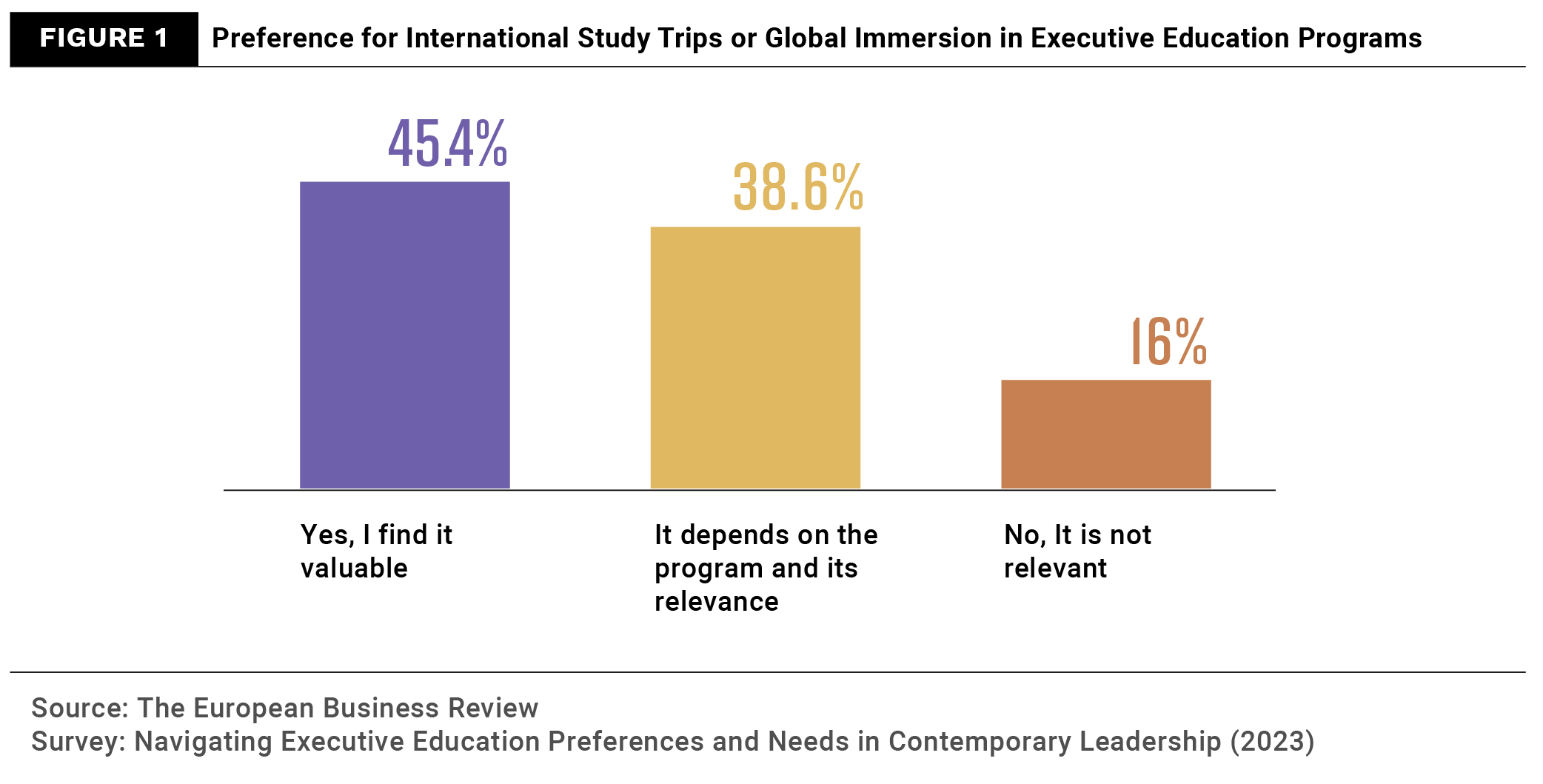
Our survey results underscore the strong interest in experiential learning among executives. 45.4% of respondents indicated that programs offering international study trips or global immersion experiences are more appealing to them. This highlights a significant preference for educational formats that provide global exposure, enabling participants to gain insights into diverse business practices and cultural nuances. 38.6% of respondents noted that their interest in such programs depends on the program’s relevance to their specific needs and career goals. This indicates a discerning approach among executives, who seek practical value and applicability in their learning experiences. Alternatively, only 16% of respondents expressed no interest in these experiential opportunities, demonstrating a clear majority leaning towards immersive, hands-on learning environments.
Insights from the Executive MBA team at the University of St.Gallen (HSG) further emphasize the importance of experiential-driven executive programs:
The rising demand for experience-driven programs in executive education reflects the current and possible future trends in work, collaboration, and learning. This market request highlights the importance of executive programs like the International EMBA HSG (IEMBA).
As industries rapidly evolve due to technological advancements and shifts in market dynamics, the lifelong learning concept is becoming more prevalent. Professionals needing to continually update their skills and knowledge via an education that addresses industry needs and career paths.
In an interconnected world, leaders must understand diverse cultural contexts and manage cross-border collaboration effectively. Experiential executive programs, with courses on global leadership and cross-cultural management, prepare executives to lead in these environments. Additionally, interdisciplinary approaches integrated into these programs enable leaders to address modern challenges holistically.
The IEMBA HSG tackles this need by offering a global perspective and a curriculum that includes different courses on leadership and personal development, thus equipping executives with the skills to lead effectively in dynamic conditions. The program facilitates networking with peers, faculty, and industry leaders and emphasizes strategic thinking to support participants in navigating and responding impactfully to market shifts.
As organizations increasingly operate in a globalized economy, the ability to understand and navigate different cultural and business contexts becomes crucial. Experiential learning programs that incorporate international elements not only broaden executives’ perspectives but also equip them with the skills needed to lead effectively in diverse settings. This trend underscores the importance of designing executive education programs that are not only theoretically robust but also practically relevant and globally oriented.

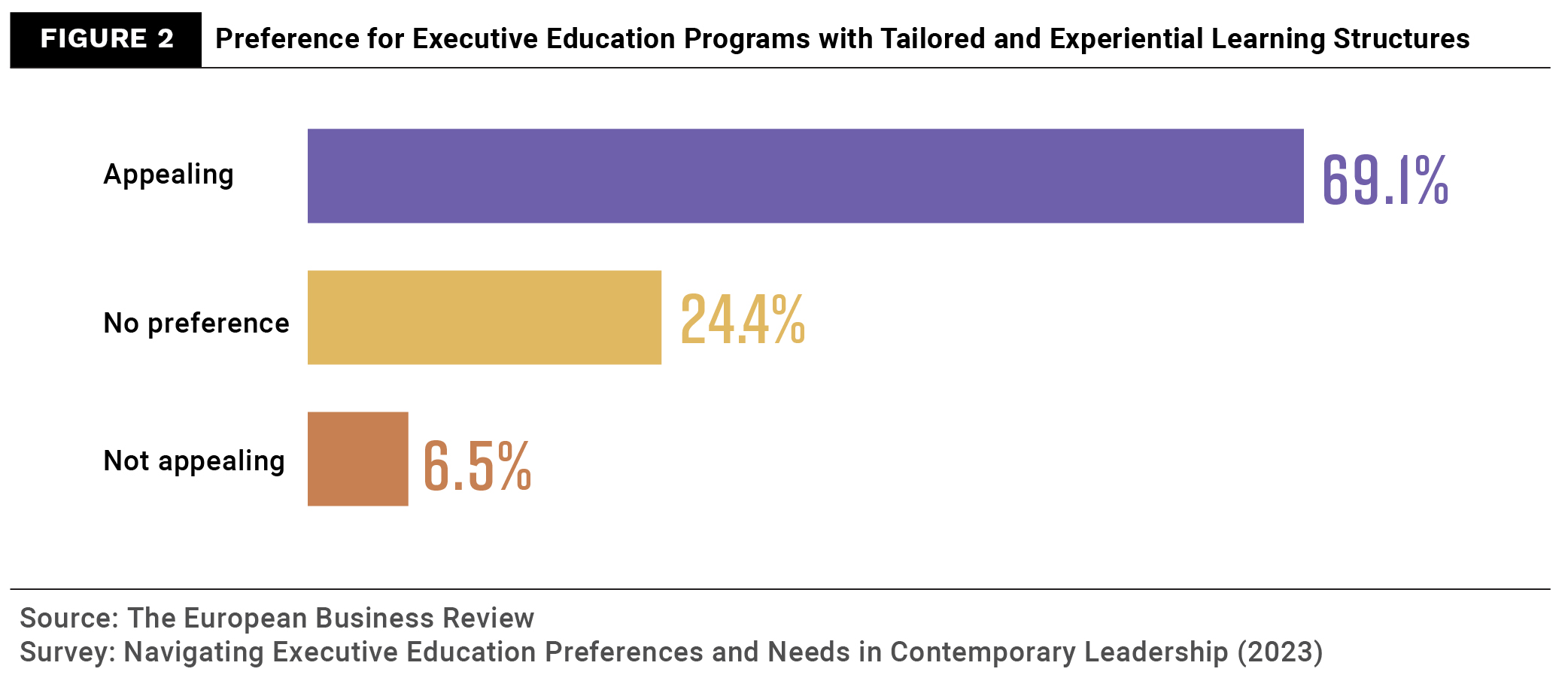
When asked about their attraction to executive education programs that place a premium on tailored or group-oriented structures—such as those emphasizing social and experiential learning, personalized learning paths, and the real-world application of knowledge within the workplace—69.1% of respondents affirmed their preference for these innovative formats. This overwhelming majority signifies a strong demand for programs that cater to specific organizational needs and foster collaborative, cohort-based learning. Meanwhile, 24.4% of respondents indicated no strong preference, and a mere 6.5% expressed no attraction to such programs.
Further insights from the Executive MBA team at St.Gallen highlight the distinguishing features of the International EMBA HSG:
The International EMBA (IEMBA) HSG offers an education experience that provides the opportunity for participants to partake in real-world experiences based on their interests and career goals. International study trips provide immersive experiences and insights into cultural dynamics and their impact on business decisions. With participants from an array of industries, the IEMBA provides a rich environment for exchanging ideas, gaining different perspectives, and enlarging one’s network.
From sharpening negotiation skills to improving strategic thinking and decision-making, leadership development is an integral part of the program, but that is not all; personalized coaching supports personal and professional growth, empowering participants to make an impact on their professional development.

St.Gallen’s insights also project the future evolution of experience-driven EMBA programs:
With technology becoming a more integral part of an EMBA program the executive programs would fiercely focus on soft skills development, emotional intelligence, and well-being, essential for navigating complex business landscapes.
Looking towards the future of executive education, the evolution of EMBA program structures will reflect technological advancements, workforce skills evolution, and business demands. The programs will increasingly leverage technology, VR, and AR simulations to provide immersive experiences for participants to gain or enhance various skills.
With technology becoming a more integral part of an EMBA program the executive programs would fiercely focus on soft skills development, emotional intelligence, and well-being, essential for navigating complex business landscapes.
By successfully blending technology, leadership development, and strategic thinking, Executive MBA programs would provide their participants with the knowledge and skills to effectively lead teams and have an immediate professional impact in a fast-paced, interconnected world.
III. Personalized Learning Paths: Meeting Individual Needs
Personalized learning paths are designed to tailor educational experiences to meet the specific needs and goals of individual learners, significantly enhancing the relevance and impact of the education received. These customized approaches recognize that each executive’s professional journey is unique, requiring targeted learning strategies that address personal and organizational objectives. By focusing on individual strengths, weaknesses, and career aspirations, personalized learning paths ensure that participants gain the most applicable and valuable insights from their educational experiences.
As Prof. Dr. Danica Purg, President of the IEDC Bled School of Management and the International Association for Management Development in Dynamic Societies (CEEMAN), an organization that plays a pivotal role in advancing and supporting emerging trends in management development, emphasizes that the organization fosters a collaborative environment where members can exchange best practices and innovative methodologies, including experiential and personalized learning journeys. This is facilitated through various programs and events such as the CEEMAN International Management Teachers Academy (IMTA), Program Management Seminar (PMS), and the annual conference. CEEMAN’s commitment to real-world application is evident in its use of case studies, simulations, and immersive experiences. Additionally, personalized learning is enhanced through individualized coaching, mentorship programs, and adaptive learning technologies, all tailored to the unique needs and career paths of senior leaders.
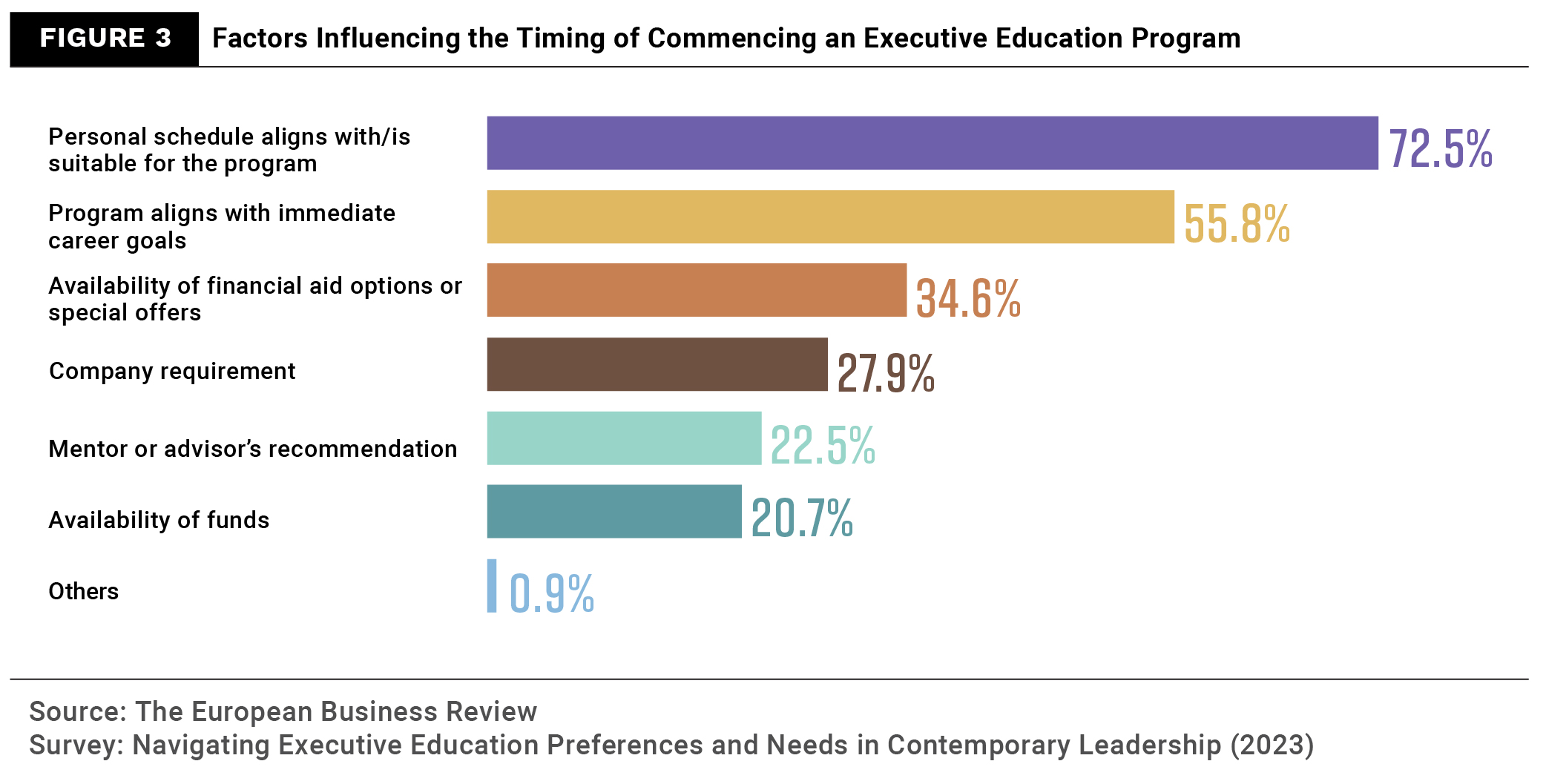
Participants in the survey highlighted several key factors influencing their decision to commence an executive education program. Timing emerged as a crucial consideration, with 72.5% of respondents prioritizing suitable programs and personal schedules. This indicates that flexibility and the ability to integrate education with professional commitments are paramount for executives. Additionally, 55.8% of respondents emphasized the importance of aligning the program with their immediate career goals, reflecting a desire for education that directly supports their professional development and advancement.
Financial considerations also play a significant role in decision-making. 34.6% of respondents indicated that financial aid options and special offers are important factors in their decision to pursue executive education. This finding highlights the need for programs to offer financial support or incentives to attract a broader range of participants. Furthermore, 27.9% of respondents consider the necessity for acquiring new skills as dictated by their company’s needs, emphasizing the importance of education that addresses specific organizational demands and prepares executives for evolving challenges.
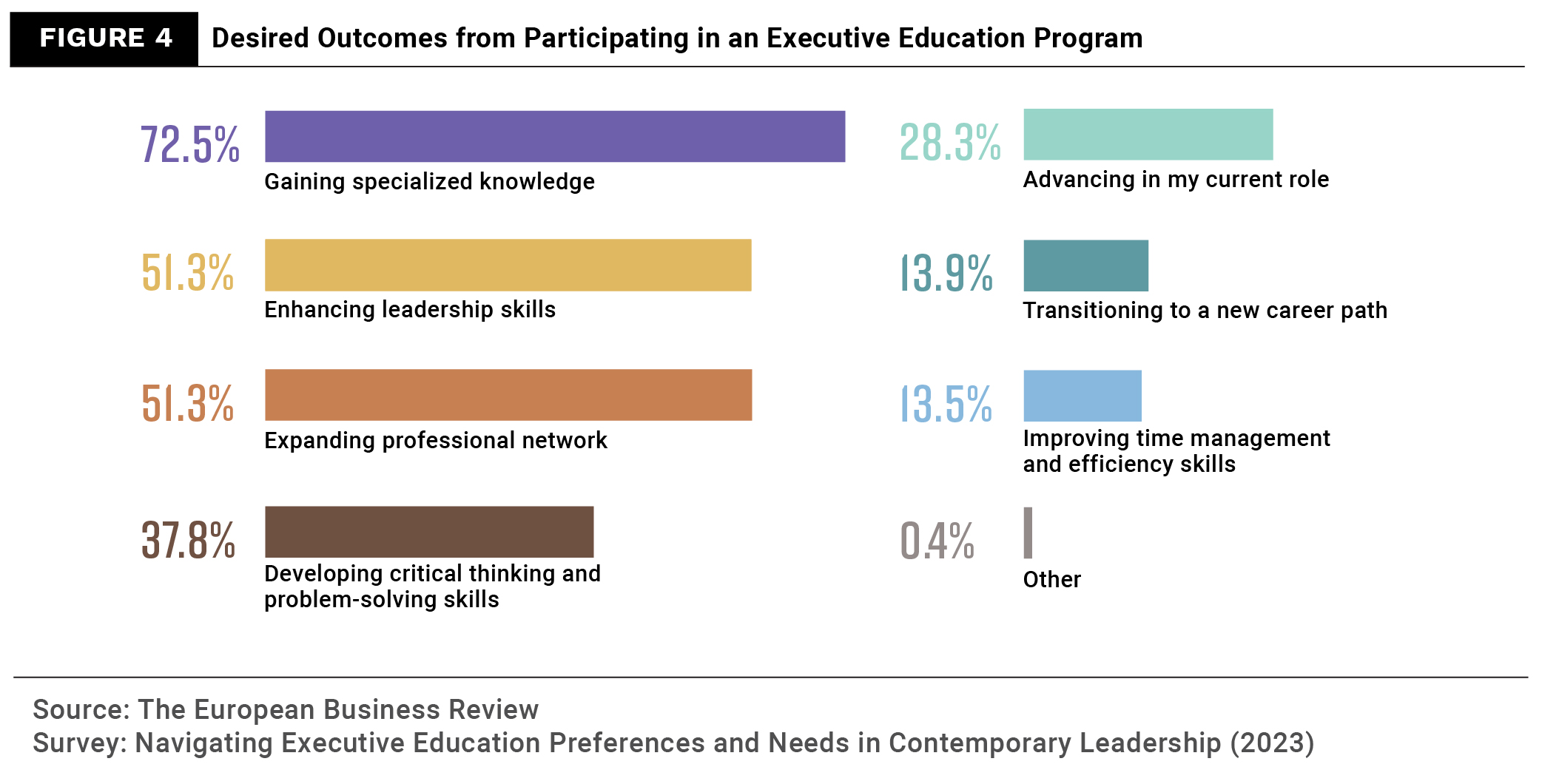
The desired outcomes from participating in an executive education program further illuminate the importance of personalized learning paths. 62.1% of respondents aim to gain specialized knowledge, while 51.3% are focused on enhancing leadership skills and expanding their professional networks. Developing critical thinking and problem-solving skills is a priority for 37.8%, with 28.3% seeking to advance in their current roles. Additionally, 13.9% are looking to transition to new career paths, and 13.5% aim to improve their time management and efficiency skills.
Personalized learning paths provide a tailored approach that supports both personal growth and organizational success, making them an essential component of modern executive education.
These survey insights reveal a clear trend towards personalized learning paths in executive education. By catering to the individual needs and preferences of executives, these programs not only enhance the relevance and impact of the education but also ensure that participants are better equipped to apply their learning in real-world contexts. Personalized learning paths provide a tailored approach that supports both personal growth and organizational success, making them an essential component of modern executive education.
IV. The Impact of Innovative Learning Approaches
Innovative learning approaches, particularly those incorporating experiential and personalized elements, have a profound impact on learning outcomes and participant satisfaction. The role of innovation in program design cannot be overstated, as it is crucial for integrating experiential and personalized learning into executive education. This involves leveraging technology, adaptive learning platforms, and immersive experiences to cater to diverse learning styles and preferences, thereby enhancing the effectiveness of educational interventions.
The future of executive education is poised to be significantly influenced by technological advancements and the increasing demand for highly personalized learning experiences. One major trend is the integration of artificial intelligence and machine learning to create adaptive learning environments. These technologies will enable the delivery of highly customized content that evolves in real-time based on the learner’s progress and feedback.

Another emerging trend is the growing emphasis on hybrid learning models, which combine online and face-to-face interactions, offering flexibility while maintaining the benefits of in-person networking and hands-on activities. The use of virtual and augmented reality is also set to enhance experiential learning through immersive simulations that replicate complex business scenarios.
CEEMAN recognizes the importance of these trends and actively provides opportunities for its members to explore and understand the potential of emerging technologies. Through initiatives such as EdTech workshops and webinars that focus on the latest tools and techniques in education, including executive education, CEEMAN facilitates knowledge sharing among its members. These efforts enable members to develop adaptive learning environments and encourage them to experiment with and adopt these innovations in their programs. In doing so, CEEMAN ensures that its members are not only aware of but also equipped to leverage future trends in executive education, thereby maintaining their competitive edge in a rapidly evolving landscape.
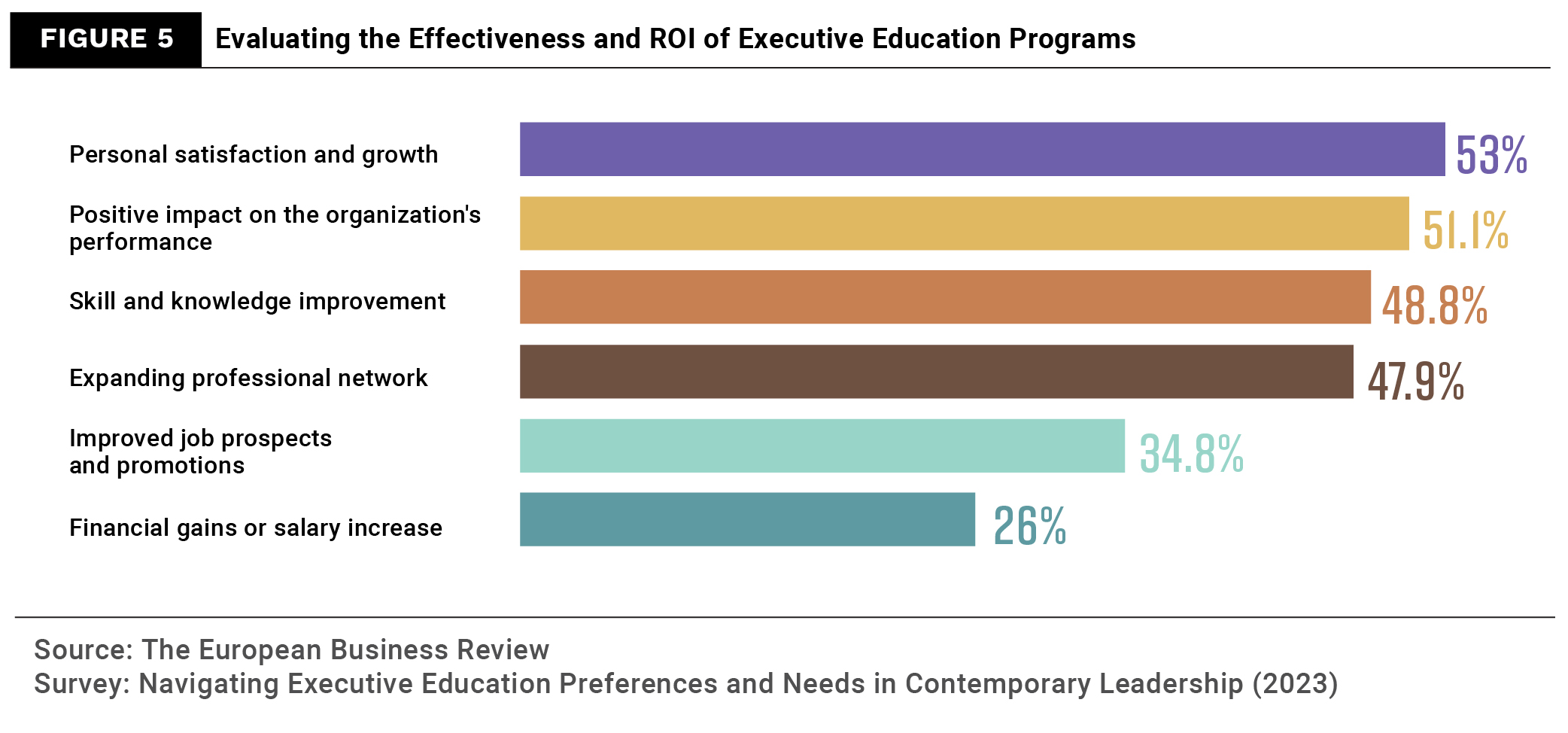
Survey insights further indicate the impact of these innovative approaches on learning preferences and outcomes. Participants reported a range of desired outcomes from executive education programs, with 53% prioritizing personal satisfaction and growth. This underscores the intrinsic value executives place on self-development and continuous improvement. 51.1% of respondents emphasize the positive impact on the organization’s performance, recognizing the critical role executive education plays in driving strategic initiatives and fostering innovation within the workplace.
48.8% of participants value skill and knowledge improvement, indicating a strong emphasis on tangible learning outcomes that directly contribute to professional growth and advancement. Similarly, 47.9% consider the expansion of their professional network as a key measure of program effectiveness. This highlights the importance of networking opportunities and collaboration in executive education, as executives seek to build strategic relationships and leverage external expertise for organizational success.
One key aspect of customizing experiential learning strategies is how they can be adapted to address diverse leadership and management challenges across various global economies. Experiential learning strategies have the potential to be highly effective across different global contexts by tailoring them to address specific regional and cultural nuances. Customization begins with a deep understanding of the local business environment, including its unique challenges, opportunities, and leadership dynamics. CEEMAN advocates for excellence, relevance, and a contextual approach where experiential learning modules are adapted to reflect the realities of different economies.

For instance, in emerging markets, leaders might face challenges related to rapid growth and scalability. Here, experiential learning can focus on crisis management, innovation under constraint, and entrepreneurial thinking. In contrast, in more developed economies, the emphasis might be on sustainability, digital transformation, and global integration. By aligning the learning experiences with these local priorities, CEEMAN ensures that executives acquire skills and insights that are directly applicable and relevant to their professional contexts.
Additionally, leveraging local case studies and bringing in regional experts to facilitate learning sessions can enrich the experience. This not only enhances relevance, but also fosters a deeper connection and engagement among participants. The use of technology also plays a crucial role in customization. Advanced learning platforms can track progress, provide real-time feedback, and adjust the learning path based on the individual’s performance and preferences. Ultimately, the goal is to create a learning journey that is both globally informed and locally relevant, empowering leaders to navigate their unique challenges effectively.
Looking ahead, the future of executive education will likely be influenced by several emerging trends in experiential and personalized learning paths. The future of executive education is poised to be significantly influenced by technological advancements and the increasing demand for highly personalized learning experiences. One major trend that CEEMAN foresees is the integration of artificial intelligence and machine learning to create adaptive learning environments. These technologies will enable the delivery of highly customized content that evolves in real time based on the learner’s progress and feedback.
The increasing demand for experiential and personalized learning in executive education underscores the pivotal role of innovative program design in meeting the evolving needs of executives.
Another trend is the growing emphasis on hybrid learning models that combine online and face-to-face interactions. This approach offers flexibility while maintaining the benefits of in-person networking and hands-on activities. The use of virtual and augmented reality is also set to enhance experiential learning by providing immersive simulations that replicate complex business scenarios.
While 34.8% of respondents expect improved job prospects and promotions as a result of their participation in executive education programs, 26% focus on the potential financial gains or salary increases. These findings reflect the multifaceted nature of ROI assessment in executive education, encompassing both career advancement opportunities and tangible financial rewards.
These survey findings underscore the transformative potential of innovative learning approaches in executive education. By aligning educational interventions with participant needs and organizational objectives, these approaches not only enhance individual learning experiences but also drive tangible business outcomes. As executives increasingly seek programs that offer personalized, experiential learning experiences, the role of innovation in program design will continue to be paramount in shaping the future of executive education.
V. Conclusion
The increasing demand for experiential and personalized learning in executive education underscores the pivotal role of innovative program design in meeting the evolving needs of executives. These approaches go beyond traditional classroom settings, offering immersive and tailored learning experiences that resonate with participants on a personal and professional level. By embracing experiential and personalized learning paths, executive education programs not only cater to individual needs and preferences but also align with broader global trends and cultural diversity considerations. In a rapidly changing professional landscape, where adaptability and agility are paramount, these innovative approaches provide executives with the tools and skills necessary to thrive in dynamic environments.
Editor’s Note:
Read the first installment here: Navigating Executive Education Preferences and Needs in Contemporary Leadership Part I: Revealing the Executive Education Hotspots
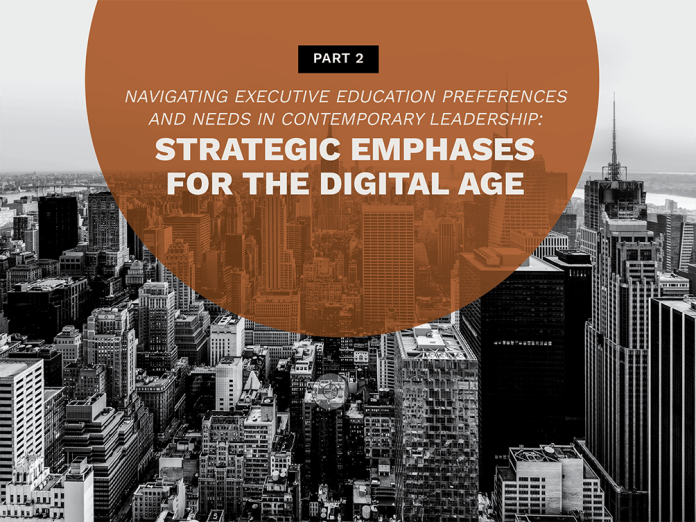 Read the second installment here: Navigating Executive Education Preferences and Needs in Contemporary Leadership Part 2: Strategic Emphases for the Digital Age
Read the second installment here: Navigating Executive Education Preferences and Needs in Contemporary Leadership Part 2: Strategic Emphases for the Digital Age
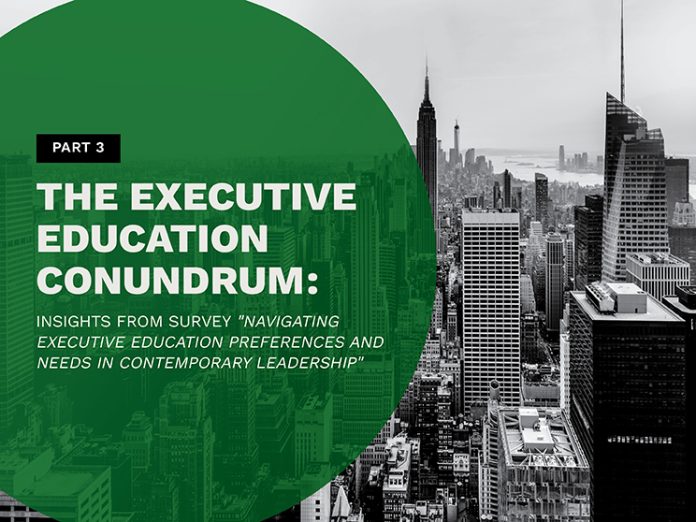 Read the third installment here: The Executive Education Conundrum: Insights from Survey “Navigating Executive Education Preferences and Needs in Contemporary Leadership” Part 3
Read the third installment here: The Executive Education Conundrum: Insights from Survey “Navigating Executive Education Preferences and Needs in Contemporary Leadership” Part 3


